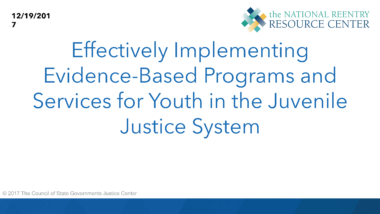Effectively Implementing Evidence Based Programs and Services for Youth in the Juvenile Justice System
Hosted by the National Reentry Resource Center with funding support from the U.S. Department of Justice’s Office of Juvenile Justice Delinquency Prevention
Programs and services are considered evidence based when they have demonstrated effectiveness through scientific research and evaluation. Both research and field experience show that implementing evidence-based programs and services with fidelity correlates to reduced recidivism rates and improved outcomes for youth in the juvenile justice system. Once juvenile justice agencies and contracted service providers institute such programs and services, however, they often encounter challenges in identifying the appropriate services and implementing them properly, consistently, and in ways that lead to better outcomes for youth. Among other approaches to these challenges, there are opportunities for policymakers to enact legislation and funding incentives to encourage the adoption of effective service approaches at the state and local levels.
This webinar highlights strategies, tools, examples, and best-practice models from across the country that juvenile justice agency managers, staff, and other practitioners may consider in adopting to effectively implement evidence-based programs and services and promote positive outcomes for youth in the juvenile justice system.
Find other events
You might also be interested in
In response to growing calls for police reform in New Jersey, particularly following the shootings of Najee Seabrooks…
Read More





















